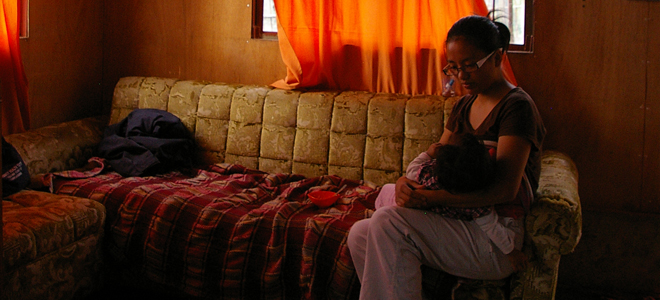Nutrition in first 1,000 days key to PH development–solons
February 3, 2016
Ensuring children’s proper nutrition during the critical early stages of their development benefits the country in the long run, two party-list lawmakers stressed in a round-table discussion organized by the Philippine Legislators’ Committee on Population and Development (PLCPD), in partnership with UNICEF Philippines and the National Nutrition Council (NNC), on January 27.
DIWA Rep. Emmeline Aglipay-Villar, PLCPD member, cited the benefits of proper nutrition on children’s physical and mental development. Nutrition interventions targeted for mothers and children during the first 1,000 days of life should thus be institutionalized, AAMBIS-OWA Rep. Sharon Garin, PLCPD vice-chair, added.
Breastmilk, best milk
Drawing from her personal experience with her four-month old daughter, Rep. Aglipay-Villar encouraged breastfeeding as best practice for mothers in nourishing their infants.
“I fell in love with the experience of breastfeeding,” she said. She shared that she insists on breastfeeding her daughter because of its benefits, even if it meant that she had to give up her medication for a sensitive health condition to avoid possible side-effects on her baby.
She noted that breastfeeding lowers the risk of child mortality and added that breastfed children have higher IQ than children fed with bottle or formula milk and have higher productivity as adults.
Rep. Aglipay-Villar also emphasized the need to enable working mothers to breastfeed their babies. She welcomed the Senate approval on third reading of the Extended Maternity Leave bill that allow 100 day-paid maternity leave for employees in both government and private sectors.
She also stressed the importance of milk banks to address the demand from mothers who cannot breastfeed due to health conditions.
Nutrition in first 1,000 days
For her part, AAMBIS-OWA Rep. Sharon Garin, PLCPD vice-chair, underscored the importance of nutrition during the first 1,000 days of life, which covers the nine months of pregnancy and the child’s first two years – a critical stage in the physical and cognitive development of a child.
“Investment during this crucial window of opportunity has profound impact on the child and eventually on national development,” Rep. Garin, author of House Bill 5914 or the First 1,000 Days Program, said.
Gains in the 16th Congress
Meanwhile, Dr. Aashima Garg, UNICEF Philippines’ Nutrition Manager, discussed the efforts of UNICEF and PLCPD to push for the First 1,000 Days Program bill in Congress and in mainstreaming the first 1,000 days framework among national and local legislators through close interaction and various learning activities.
UNICEF and PLCPD have been working together to advance legislation that will ensure children’s rights are protected and fulfilled, Dr. Garg shared. She urged the advocates to continue to work together to forward the nutrition agenda this 2016 to sustain the momentum gained last year.
Ms. Nenita Dalde, PLCPD manager for national advocacy, echoed this call. “We have made significant progress on the First 1,000 Days and Extended Maternity bills. We race against time to pass these bills in the 16th Congress but we should remain committed to push for these bills till the last minute,” she said.
Multisectoral effort
The PLCPD forum also gathered government officials and advocates from civil society to discuss policy gaps and come up with policy recommendations to promote maternal and child nutrition in the country.
Among the recommendations agreed upon by the participants are: the immediate enactment of the First 1,000 Days and Extended Maternity Leave bills; active promotion of breastfeeding, complementary feeding, and food fortification; appropriation of sufficient budget to implement nutrition programs; institutionalization of position and benefits of municipal nutrition action officer and barangay nutrition scholars; regulation of marketing of low-nutrition food for children; and immediate food and nutrition relief in emergencies.
Ms. Didi Vega, director of the NNC’s policy division, emphasized the importance of a united stand and consolidated efforts of advocates to strengthen the call for responsive nutrition policies and programs.
Ms. Dalde also urged the advocates should take the opportunity in 2016 elections to mainstream nutrition issues and influence candidates’ platforms.

